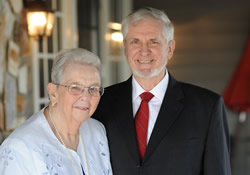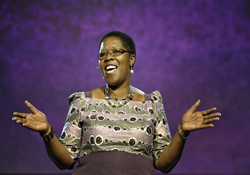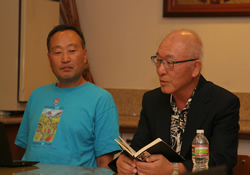
Tithing. To many United Methodists, the idea is scary and fraught with anxiety. To others, it is exciting, inviting — and the right thing to do.
In the Bible, the law given through Moses required that the Israelites give a tithe or one-tenth of the produce of their land and livestock to support the Levitical priesthood (Leviticus 27:30-33). Today, many Christians donate a tithe, or 10 percent of their income, to support their church ministry and misson.
For Sally Curtis AsKew, tithing is a no-brainer.
"Both my husband, Albert, and I have tithed ever since we can remember," says AsKew of Oconee Street United Methodist Church, Athens, Ga. As children, they learned to tithe at home and in church and Sunday school.
Saying tithing is simply a way to fulfill "our responsibility as Christians to share what we have with others," AsKew admits that tithing can prove challenging.
"When we were first married, and Albert was pastor of three small churches and a student in theology school, I was teaching school," she recalls. "Even in 1962, that meant if we gave all our tithe, we would be the largest givers in any of those churches." However, tithing also allowed the couple to improve the parsonages in which they lived and to support their United Methodist alma maters.
Does tithing affect how they use the other 90 percent of their income?
"Possibly," AsKew says, "tithing has made us more aware of the need to be careful about how we spend the other 90 percent. We have never dipped into the 10 percent to make ends meet.
"At one time, Albert kept a separate bank account for the tithe of his monthly income. He was always very careful to tithe gifts from churches and any inherited money. After I took over keeping our finances, I followed his example. I transfer the tithe of our retirement and Social Security checks to a separate account in Quicken, which I use to manage our finances."

Tithing as a lifestyle
Betty Katiyo, a member of Inner City United Methodist Church, Harare, Zimbabwe, is also a tither.
"Tithing is a matter of obedience," she says. "God blesses us when we are faithful."
The associate secretary of the West Zimbabwe Annual Conference added, "Tithing sustains the church in making disciples of Jesus Christ and helps the church reach out to widows, orphans and the poor in the community."
The Rev. Sungho Lee of Concord United Methodist Church, Santa Clara, Calif., agrees.
"Tithing is our faith expression," he says. "We say that our lives belong to God, and we give one day a week to God for worship. We say that our possessions also belong to God, and we give one-tenth of our income for mission and ministry.
"Sunday worship and the tithe are our basic faith statements on which we build up social justice and mission outreach," he continues. "Without the foundation, people tend to boast of what they did ‘in their own names.' With the foundation, people humble themselves and praise God's name, even when they transform the world. Whose church is it? It depends on your answer in tithing."
In his E-pistle, "Teaching Tithing," Indiana Area Bishop Michael J. Coyner, who serves as president of the General Council on Finance and Administration, encouraged pastors to see tithing as the lifestyle of a person of faith. He outlined three points:

"Tithing is not a rule; it is a revelation. We are invited to adopt a tithing lifestyle ... because it is part of God's revelation that a generous life is the best life to live.
"Tithing is not about accounting; it is about acknowledging that God is the source of all gifts. Yes, the 10 percent mathematics of tithing helps us to demonstrate that acknowledgement, but the real issue is to acknowledge that God is the God of all things — including our possessions. In the midst of a consumer culture here in America, that is an important acknowledgement for us.
"Tithing is not about finances, it is about faith. This is not about raising money for the local church or the annual conference; it is about teaching our people to be faithful to God."
‘We have not looked back'
Sherri Williams, a certified lay servant at First United Methodist Church, Leavenworth, Kan., tackled the sometimes-taboo subject of tithing in her "Simply Sherri" blog. For her and her husband, Shannon, tithing was an on-again, off-again topic.
"We always tried to give 10 percent," she wrote, "but sometimes it was really hard and we were unable (to tithe), but we always gave. When we first moved here, we were struggling financially."
Then Leavenworth First started the "Extravagant Generosity" (Abingdon Press) study. "It had a book of daily readings," Williams said. One of the Scriptures was Malachi 3:10, in which God urges, "Bring your full tithe to the temple treasury. ... Test me in this and see if I don't open up heaven itself to you and pour out blessings beyond your wildest dreams" (The Message).

That verse inspired Sherri and Shannon Williams, who was preparing to retire from the military. However, the prospect of tithing was daunting.
"We didn't really know what the future held for us as far as a job for him and our financial future," she wrote, "but here was God — telling us to trust him and if we did, he'd make it worth our while. We jumped in with both feet, no holding on to the sides!
"We have not looked back since. At least once a month, (we) will read the Scripture again and comment on how blessed we have been. We aren't independently wealthy by any stretch of the mind, and since my husband is a contractor for the military, his job is not always the most secure, but we are blessed beyond measure, and we don't worry that much anymore.
"Sometimes it's really hard! I know it is! But we have found it worth it."
Barbara Dunlap-Berg is associate editor of Interpreter and general church content editor at United Methodist Communications, Nashville, Tenn.
What does The United Methodist Church say about tithing?
While Methodism's founder John Wesley did not talk directly about tithing, he had plenty to say about stewardship. In his sermon on "The Use of Money," he described money as "an excellent gift of God, answering the noblest ends."
"In the hands of his children," Wesley said, "it is food for the hungry, drink for the thirsty, raiment for the naked: it gives to the traveler and the stranger where to lay his head. By it we may supply the place of an husband to the widow, and of a father to the fatherless. We may be a defense for the oppressed, a means of health to the sick, of ease to them that are in pain; it may be as eyes to the blind, as feet to the lame; yea, a lifter up from the gates of death!"
The Book of Discipline 2012 (Par. 258.4) advises local churches, "It is strongly recommended that the committee on finance, in collaboration with the church council, find creative ways to turn their congregations into tithing congregations with an attitude of generosity."
Originally published in Interpreter Magazine, July-August, 2014.
